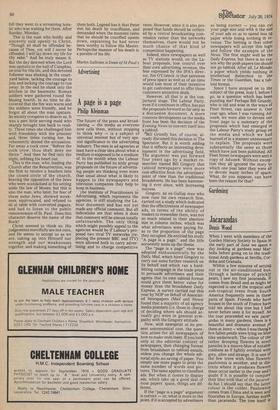Advertising
A page is a page
Philip Kleinman
The future of the press and broadcasting — the media as everyone now calls them, without stopping to think why — is a subject of universal interest but of very special significance to the advertising industry. The men in ad agencies at least have a clear idea about what a medium is supposed to be a medium of. In the month when the Labour Party has published its stidy group proposals on the future of advertising people are thinking even more than usual about what is likely to happen to the newspapers and television companies they help to keep in business.
fhe Institute of Practitioners in. Advertising, which represents the agencies, is still studying the Labour document and has not yet made any official comment. But all indications are that when it does that comment will be almost totally unfavourable. The only thing which might possibly appeal to the agencies would be if Labour's proposed two rival TV networks (replacing the present BBC and ITV) were allowed both to carry advertising and to charge competitive rates. However, since it is also proposed that funds should be collect ed by. a central broadcasting commission rather than the networks themselves, there would not be much chance of that kind of competition happening.
Indeed, since newspapers as well as TV stations would, on the La bour proposals, lose control over their .own advertising revenue, the fear expressed by the IPA's direc tor, Jim O'Connor, is that salesmen of press space as well as of air-time would lose most of their incentive to get customers and to offer those customers attractive deals.
However, all that is at the conjectural stage. The Labour Party, even if it continues in office, has put the proposals forward so far only as a discussion document. A more concrete development on the media front has been the decision of the Evening News to convert itself into a .tabloid.
'Bill Grundy has, of course, already discussed this decision in The Spectator. But it is worth adding that it reflects an interesting development in the advertising field.
The argument was put forward four years ago by a market researcher named Bill Gregory that tabloid newspapers were more cost-effective from the advertisers' point of view than the traditional broadsheets. He has been hammering it ever since, with increasing success.
Gregory, an ex-Gallup man who now runs his own research firm, carried out a study which indicated that the effectiveness of newspaper ads, in terms of the ability of readers to remember them, was not so much related to their absolute size in column inches, which was what advertisers were paying for, as to the proportion of the page they occupied. He entitled his study "A page is a page," and the title accurately sums up the thesis.
The "page is a page" view was adopted enthusiastically by the Daily Mail, which hired Gregory to carry out some further research on its behalf and which ran a hard hitting campaign in the trade press to persuade advertisers and their agents that its own tabloid format could give them better value for money than the broadsheet Daily Express. A survey carried out this year by NOP on behalf of Associated Newspapers (Mail and News) found that a majority of ad agency media planners (i.e. those in charge of deciding where ads should actually go) were in general sympathy with the Gregory attitude.
Now, with newsprint at its present astronomical cost, the ques tion arises for all newspapers of how to make ends meet. If you look only at the editorial content of newspapers; then changing format from broadsheet to tabloid entails, unless you change the whole edi torial style, no saving of paper. You simply use more pages to print the same number of words and pic tures. The same applies to classified ads. But when it comes to display ads, which take up a good deal of most papers' space, things are different.
If the "page is a page" argument' is correct — or, what is more to the point, if it is accepted by advertisers as being correct — you can cut your page size and with it the size of your ads so as to spend less 0.1) paper while losing nothing ih revenue. The betting is that other newspapers will accept this logic and follow the example of the News. The first might well be the Daily Express, but there is no reason why the posh papers too should not go tabloid. After all, Le Monde, a paper which yields nothing in intellectual distinction to the Times or the Guardian, has a tabloid format.
Since I have strayed on to the subject of the press, may I, before I go, as a question which has been puzzling me? Perhaps Bill Grundy, who is old and wise in the ways of Fleet Street, can answer it. One year ago, when I was running Ad week, we were able to devote our front page to a summary of the proposals which had emerged in the Labour Party's study group on the media and which we had learned of in a manner unnecessary to explain. The proposals were substantially the same as those which have just been published. All Fleet Street newspapers were sent a copy of Adweek. Without exception they all ignored the story to which one year later they were all to devote many inches of space. What, do you suppose, can have been the reason for that?


































 Previous page
Previous page